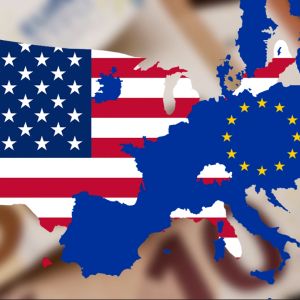Unions in Ireland, France, and the rest of Europe are urging Brussels to remove food and drink items from the list of retaliatory tariffs against the U.S. The EU has planned to impose 50% tariffs on bourbon whiskey after the U.S. announced a 25% tariff on steel and aluminum. U.S. President Donald Trump had threatened to respond with 200% tariffs on European drinks, including wine, champagne, and whiskey. Bloc leaders worry about dangerous cycle of revenge French, Italian, and Irish officials have objected to the EU’s plan. Jack Chambers, Ireland’s public expenditure minister, warned against “retaliatory and tit-for-tat measures that could worsen a trade dispute.” Italian Prime Minister Giorgia Meloni told the Financial Times that the EU should talk with the U.S. about its high duties. “There are big differences in the single goods,” she said. “That’s what we have to work on to find a good, common solution.” Her agriculture minister, Francesco Lollobrigida, echoed that sentiment, saying, “We fear any further burden that will create more difficult conditions [for wine exports]. But we aren’t terrified.” Officials and industry representatives are also calling for a delay in final decisions, hoping to open the door to negotiations. Paris pressed the Commission to postpone its measures from April 1 to mid-April, hoping to gain more time for talks. However, officials in Brussels say the effort to negotiate has not progressed much. This week, Trump went beyond his original steps by adding 25% tariffs on cars. He declared April 2 “Liberation Day,” with plans for sweeping tariffs on all goods, on top of those already in place. The EU’s top negotiator told colleagues that this might force the EU to pay at least 20% overall. The Commission’s response is a package of tariffs on €26bn of U.S. imports, which is set for approval by member states to take effect on April 12. Some EU industries are calling for exemptions due to trade risks When the Commission released its proposal, it also provided a 99-page list of possible targets, ranging from soybeans to personal care goods. Companies and governments were given until March 26 to file objections. Peter Burke, Ireland’s trade minister, said that the Irish government has “made our concerns clearly known to the EU including in relation to the dairy and spirit drinks sectors.” He said the bloc is “open to fine-tuning its rebalancing measures” to protect the interests of producers, exporters, and consumers. Europe’s spirits lobby is pushing to exempt bourbon. The EU timber sector wants wood dropped from the list, fearing it could harm its trade. Meanwhile, Copa-Cogeca, representing farmers, wants soybeans removed from the final retaliation list, saying it is essential to animal feed products. A spokesperson explained, “Agrifood sector should be kept out of the scope of the retaliation or any disputes that don’t concern it.” Diplomats note that the Commission holds strong influence since member states would need a weighted majority to block its plan. One European diplomat said, “It’s not surprising that governments are doing this — they are standing up for their interests. But I am confident that there is going to be a strong package from the Commission that will be approved. If we block this then we are screwed — and member states know that.” Cryptopolitan Academy: Coming Soon - A New Way to Earn Passive Income with DeFi in 2025. Learn More














